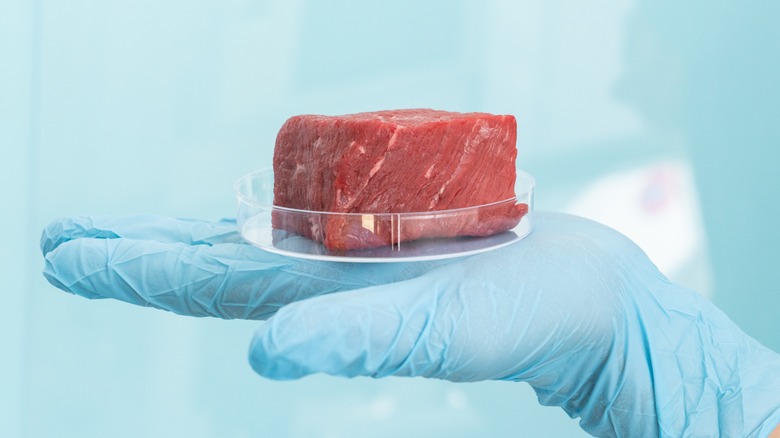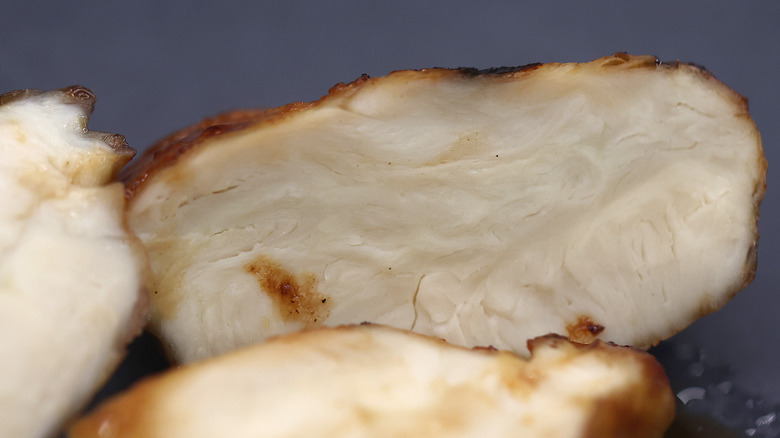The Complicated Answer To If Lab-Grown Meat Is Halal And Kosher
Lab-grown meat is hailed by some as a scientific advancement that could one day become an ethical and environmentally friendly replacement for animal products. Some speculate that in the future this process might take the place of livestock farming as our primary source of meat production, though it's likely the pushback there would be enormous. In the meantime, the two companies that have received USDA approval are trying to make sure that this slaughter-free meat is available to everyone. That includes those of the Islamic and Jewish faiths, who often have to adhere to restrictions on the food they eat, particularly when it comes to the consumption of animal products. The question of whether or not lab-grown meat is kosher or halal is a complicated and likely ongoing discussion. For lab-grown meat to be halal or kosher, certain guidelines would need to apply. And there are questions about whether it's possible to observe those guidelines.
Lab-cultivated meat is cultivated from cells that are harvested primarily from living animals, before being grown in bioreactors filled with a nutrient bath that feeds the product. Both halal and kosher practices predate this process by thousands of years. Figuring out exactly where this relatively recent food development belongs within these religious traditions is going to take some time. However, the companies currently making lab-grown meat are trying their best to comply with the halal and kosher traditions.
Is lab-grown meat halal?
Is lab-grown meat halal? Well, that depends on whom you ask. For meat to be halal instead of haram (unacceptable under Islamic law) it has comply to with a certain set of rules that pertain to the slaughter of the animal, how the meat is taken, the condition of the animal before slaughter, and several other factors. As long as the lab-cultivated meat comes from a donor that matches these requirements, it would be considered halal, but that might be easier said than done.
Islamic religious scholars working with the lab-grown meat producer GOOD Meat say that in order to be halal the meat has to come from species that aren't prohibited by religious rules, such as pigs. The nutrient bath used to feed the cultivated cells also can't contain substances like alcohol or blood that's been spilled. The next stipulation is where this gets dicey. It's against halal rules to eat meat taken from a living animal. So, in order for lab-grown meat to fall in line, it must come from a dead animal recently slaughtered by halal standards. This breaks the "slaughter-free" idea many cultivated meat companies are striving for. One way to get around this is to use cells taken from a chicken feather, which some companies have assured is possible, since feathers, wool, and other such animal products contain the cells necessary to create lab-grown meat.
Is lab-grown meat kosher?
Kosher meat must be procured under similar restrictions to halal meat. It must come from a healthy animal, the animal must be slaughtered in a certain manner with a blade of specific quality, only certain parts of an animal can be used, and the meat has to go through a specific curing process to remove the blood. Outside of the use of prohibited animals, such as pigs and shellfish, the question of whether or not lab-grown meat is kosher comes down to whether religious leaders believe it counts as meat.
Some Jewish religious leaders, such as Israeli Chief Rabbi David Lau, view lab-cultivated meat as something other than meat and believe it's kosher as long as the ingredients used in it are kosher as well. Others, such as the CEO of the kosher certification authority Orthodox Union, Rabbi Menachem Genack, believe the cultivated meat can't be kosher unless the cells to cultivate it are harvested from an animal recently slaughtered according to kosher guidelines. Similar to halal standards, Genack believes even a single cell taken from a living animal would mean the resultant meat is not kosher, which poses the same problem for those trying to avoid harm to animals. At the end of the day, it's going to take much time and discussion to determine if lab-grown meat is kosher or halal.


